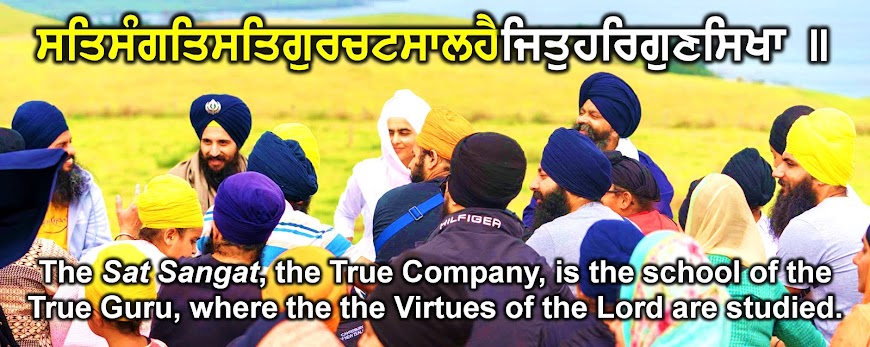Note: In the following verses the five inhabitable spiritual
realms (Khands) are described, which gives a glimpse of the unseen creation beyond this world. These spiritual realms are where
souls can go in the world beyond. These realms are not only the journey of the soul
in the world beyond but also indicates the soul’s spiritual development in this
world. The souls in the different spiritual realms reflect the individual’s stages
of consciousness whilst alive. For the purpose of beginners the translation of the Khands given below relates the Khands to five spiritual stages of spiritual seekers.
raa-tee(n) ru-tee(n), thit-ee(n) vaar.
(In the first spiritual stage of living the righteous
path - Dharam Khand - one accepts) Vaheguru created the nights, seasons, moon cycle, days,
pavaN paa-Nee,
ag-nee paa-taal.
wind, water, fire, and regions below.
tis vich Dhar-tee, thaap rakh-ee Dharam saal.
They accept that within this, the Earth was
set up as a place of spiritual learning and growth.
A ‘Dharam-Saal’ refers to a place where people learn about Dharam (spiritual living), as
well as a place of accommodation and rest without a fee. Similarly, the world
is like a rest house and spiritual school for us to develop and grow into
beautiful spiritual beings.
tis vich, jeea jugat key rang.
Within it, they accept Vaheguru made various
forms and colours of species.
tin key naam
a-ney’k a-nant.
They recognise that there are unaccountable names
of created life.
kar-mee kar-mee, ho-e vee-chaar.
They accept that each and every action of
theirs is judged Vaheguru,
sach-aa aap, sach-aa
dar-baar.
Vaheguru True (i.e, just), and True is Their Divine-Court.
Vaheguru is just, and Their Divine-Court is also just. Vaheguru does not
do injustice to anybody.
tith-ai so-han pann’ch
par-vaaN.
There (in Vaheguru’s Court), the saints who
listened and obeyed the Guru’s Wisdom look beautiful and are accepted.
nad-ree karam, pav-ai
nee-shaaN.
They (the saints) are marked with the sign of
the Merciful Vaheguru’s Grace (blessing).
With the blessings of Vaheguru, the saints shine with glory and
greatness.
kach p-kaa-ee, oh-thai paa-e.
The ripe (i.e. good) and unripe (i.e. bad) are
judged there.
naa-nak gayaa(n), jaa-pai jaa-e. ||34||
(Guru) Nanak (Ji) says- when you will arrive at this place (in the world
beyond), you will get to know this.
||34||
There is an afterlife without a doubt and a
place of judgment (the court of Dharam Khand). Everyone will come to experience
it. The spiritually wise listen to the Guru’s Wisdom and prepare for this
eventual reality.
Dharam khann’d, kaa ey-ho
Dharam.
This (i.e. the above narration) is what
happens in Dharam Khand, the spiritual stage of living the righteous life (the first spiritual
stop on the journey towards Vaheguru).
gi-yaan khann’d, kaa aakh-hu
karam.
And now what happens in Gian Khand, the stage of knowledge, (the second spiritual stop on the journey towards
Vaheguru,) is narrated.
key-tey pavaN paa-Nee
vai-sann-tar,
key-tey kaan m-hey’sh.
In the second stage, one gains awareness of –
numerous winds, waters, and fires, as well as
numerous Krishnas and destructive forces (i.e.
invisible forces and powers);
key-tey bar-mey
ghaa-Rat gha-Ree-eh,
roop rang key
vey’s.
numerous creative forces fashioning different
kinds of forms, colours, and appearances;
key-tee-yaa
karam bhoo-mee, mey’r key-tey,
key-tey Dhoo up-dey’s.
numerous worlds for acting karma, numerous mountains, and numerous
exemplary saints like Dhru;
key-tey inn’d chann’d, soor key-tey,
key-tey mann-dal dey’s.
numerous skies, numerous moons and suns, and numerous
galaxies and lands;
key-tey siDh
buDh, naath key-tey,
key-tey dey-vee
vey’s.
numerous Sidhs (spiritual
achievers) and Buddhas (Buddhist monks), numerous masters of Yoga, and numerous
feminine forces of nature of various kinds;
key-tey dey’v daa-nav mun key-tey,
key-tey ratan s-munn’d.
numerous godly-minded
and demon-minded powers, numerous sages, and numerous jewels and oceans;
key-tee-aa
khaa-Nee, key-tee-yaa baa-Nee,
key-tey paat n-rinn’d.
numerous ways of how life is born, numerous ways
of communicating, and numerous dynasties of rulers;
key-tee-yaa
sur-tee, sey-vak key-tey,
naa-nak ann’t na ann’t.
||35||
and, numerous conscience beings and numerous
selfless servants. (Guru) Nanak (Ji says) – (in this stage one becomes aware
that) Vaheguru’s limit has no end! ||35||
In the stage of
knowledge, one gets spiritual awareness of the vastness of the creation and
realises that despite the diversity and vastness of the creation, there is a
Oneness within it all, i.e. Vaheguru.
gi-yaan khann’d meh, gi-yaan
par-chann’d.
In Gian Khand, the stage of spiritual knowledge, one is
completely filled with spiritual knowledge.
One living in the stage of spiritual
knowledge is fully aware of what has happened and what is going to happen.
tith-ai naad binod, ko’dd a-nand.
In this stage, one experiences the melody of the universe, amazing wonders, and joy.
saram khann’d kee, baa-Nee
roop.
Saram Khand, the stage of effort, (the third
spiritual stop on the journey towards Vaheguru,) is where spiritual beauty is
formed.
tith-ai ghaa-Rat ghaRee-yai, b-hut a-noop.
In this stage, many forms of matchless beauty
are fashioned.
taa kee-aa(n) gal-aa(n), k-thee-yaa naa jaa-eh.
Talk about this stage cannot be described.
jey ko keh-ai,
pishh-ai p-shhu-taa-e.
One who tries to describe it regrets the
attempt (as it is impossible).
tith-ai ghaRee-yai, su-rat mat man buDh.
In this stage, awareness, intellect, thoughts,
and wisdom are moulded (i.e. they are elevated and shaped to become beautiful).
tith-ai ghaRee-yai, su-raa siDh-aa kee suDh.
||36||
In this stage, one’s awareness becomes that
of angels and spiritual achievers. ||36||
karam khann’d
kee, baa-Nee jo’r.
(The fourth spiritual stop on the journey
towards Vaheguru,) Karam Khand, the stage of Grace, is made of spiritual strength.
When one receives the Grace or one receives
the blessings of Vaheguru, they develop such inner strength that they can overcome
their desires and vices and ensure they don’t come under their influence.
tith-ai, ho’r na
ko-ee ho’r.
Other than the spiritually strong, no one
else lives in this stage.
tith-ai, joDh m-haa-bal soor.
Those in this stage are warriors of great
power and spiritual heroes,
tin meh, raam reh-yaa bhar-poor.
because within, they are totally filled with Vaheguru’s
presence.
tith-ai, see-to see-taa
meh-maa maa-eh.
In this stage, the souls
of the devotees are firmly woven with Vaheguru’s Praises.
taa key roop, na
kath-ney jaa-eh.
Their spiritual beauty is
beyond description.
The faces of such
blessed souls radiate and glow with light.
naa oh-eh mar-eh, na Thaa-gey jaa-eh.
Neither death (of
conscience) nor deception comes to those,
jin kai raam,
vas-ai man maa-eh.
within whose minds Vaheguru
abides.
tith-ai bhagat, vas-eh key
loa.
There are devotees of
many worlds living in this stage,
k-reh a-nand sach-aa man so-e.
who rejoice because the
True One fills their heart.
sach khandd
vas-ai nirann-kaar.
In Sach Khand, the ultimate stage of union with Vaheguru, (i.e.
the final stop to Vaheguru), the Formless Lord Themself comes to abide within,
When one’s ego and
falsehood leave them, what is left is Vaheguru alone. This is the ultimate
stage of union and also describes Vaheguru’s House beyond this world.
kar kar vey-khai, nadar ni-haal.
who having created the
creation, watches over it and with Their Glance of kindness.
tith-ai khann’d, mann-dal, var-bhann’d.
In this stage, one can
see numerous planets, galaxies, and universes.
Before the invention of
telescopes and satellites, many spiritually progressed holy mystics and saints
had knowledge of the stars, planets and galaxies through inner-knowledge gained
from God.
jey ko kath-ai, ta ann’t, na ann’t.
If one were to speak
about this, there would be no limit to its end.
tith-ai
loa loa, aa-kaar.
In this stage, one sees
many universes.
Alternative translation: In this stage, one sees all forms of creations and forms of the divine-light.
jiv jiv hukam, tiv-ai
tiv kaar.
(In this stage,) as
Vaheguru commands, so do they act and behave.
A person in this stage
does not act on ego or follow their own way, but instead acts and lives in
accordance with Vaheguru’s way, as prescribed in Sri Guru Granth Sahib Ji.
vey-khai
vig-sai, kar vee-chaar.
(In this stage one sees
that) Vaheguru thoughtfully watches over (i.e. cares for) all and is happy.
naa-nak, kath-naa, kar-Raa saar. ||37||
(Guru) Nanak (Ji) says- it is as hard as steel, i.e. very hard, to describe this
stage. ||37||









